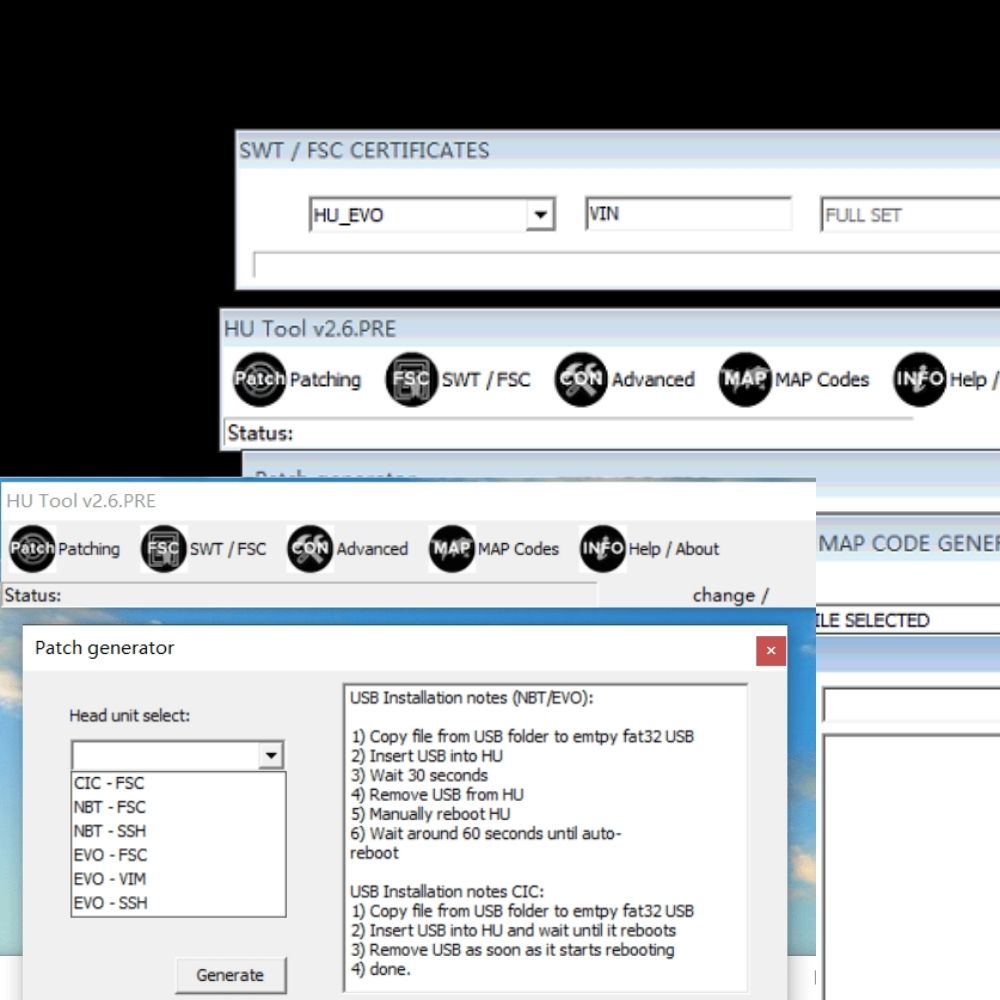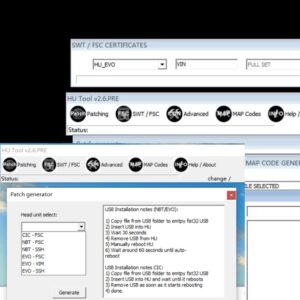

Is BMW Code 4F97 Haunting Your Transmission?
BMW code 4F97 indicates a transmission malfunction, specifically related to the transmission ratio monitoring. Identifying the root cause of the BMW 4F97 code is crucial for restoring smooth gear shifts and avoiding further transmission issues. AutoExplain offers remote diagnostic and programming services, providing expert assistance to pinpoint the problem and guide you through the necessary repairs, including ECU programming and software updates, to get your BMW back on the road quickly and efficiently.
Table of Contents
Toggle1. What Does BMW Transmission Code 4F97 Mean?
BMW transmission code 4F97 indicates a problem with the transmission’s gear ratio monitoring system. Specifically, it means the transmission control module (TCM) has detected an implausible gear ratio, which can arise from mechanical issues within the transmission, sensor malfunctions, or even software glitches. Understanding this code is the first step to diagnosing and fixing the underlying problem.
- Gear Ratio Monitoring Defined: The TCM constantly monitors the input speed (from the engine) and the output speed (to the wheels) to calculate the gear ratio. If this calculated ratio deviates from the expected value for the selected gear, code 4F97 is triggered.
- Symptoms:
- Transmission stuck in gear
- Erratic shifting
- Sluggish acceleration
- Transmission warning light on the dashboard
2. What Causes BMW Code 4F97?
Several factors can trigger BMW code 4F97, ranging from mechanical failures to electronic glitches. Identifying the root cause is crucial for an effective repair.
- Low Transmission Fluid: Inadequate fluid levels can lead to slipping and incorrect gear ratios. Always check the fluid level and condition first.
- Faulty Transmission Sensors: Input speed sensors and output speed sensors provide data to the TCM. Malfunctioning sensors can send incorrect data, triggering the code.
- Worn or Damaged Gears/Clutches: Internal mechanical issues, such as worn gears or damaged clutch packs, can cause the transmission to slip and produce incorrect gear ratios.
- Valve Body Issues: The valve body controls the flow of transmission fluid. Problems here can lead to improper shifting and trigger the code.
- Software Glitches: Occasionally, software bugs in the TCM can cause false readings and trigger the code.
- Wiring Problems: Damaged or corroded wiring to the transmission sensors or TCM can disrupt signals and cause the code to appear.
3. How to Diagnose BMW Code 4F97
Diagnosing BMW code 4F97 requires a systematic approach to pinpoint the exact cause. Follow these steps to ensure accurate diagnosis:
- Scan for Codes: Use an OBD-II scanner to confirm the presence of code 4F97 and check for any other related codes.
- Check Transmission Fluid: Inspect the fluid level and condition. Low or dirty fluid can cause shifting problems.
- Inspect Sensors: Check the input and output speed sensors for damage. Use a multimeter to test their resistance and signal output.
- Wiring Inspection: Examine the wiring and connectors leading to the transmission and sensors for any signs of damage or corrosion.
- Valve Body Inspection: If possible, inspect the valve body for any visible signs of wear or damage. This may require removing the transmission pan.
- TCM Check: Verify the TCM is functioning correctly. Check for any software updates or known issues related to the TCM.
- Road Test: After addressing any identified issues, perform a road test to see if the code returns.
4. What Are the Common Symptoms Associated With BMW 4F97?
Recognizing the symptoms associated with BMW code 4F97 can help you diagnose the issue more quickly. Here are some common symptoms:
- Erratic Shifting: The transmission may shift at incorrect times or hesitate between gears.
- Transmission Slipping: The engine RPMs may increase without a corresponding increase in vehicle speed.
- Stuck in Gear: The transmission may become stuck in a particular gear, unable to shift up or down.
- Neutral Display Issues: The gear selector might display “N” (Neutral) regardless of the actual gear engaged.
- Reduced Power: The vehicle may experience a noticeable loss of power and acceleration.
- Transmission Warning Light: The transmission warning light or check engine light will illuminate on the dashboard.
5. Step-by-Step Guide To Fix BMW Code 4F97
Here’s a detailed guide on how to fix BMW code 4F97, covering potential solutions:
- Check and Replace Transmission Fluid:
- Why: Low or degraded fluid can cause transmission issues.
- How:
- Locate the transmission fluid dipstick (if equipped) or the fill plug.
- Check the fluid level and condition. It should be pinkish-red and free of debris.
- If the fluid is low or dirty, drain the old fluid and replace it with the correct type of BMW-approved transmission fluid.
- Replace Faulty Sensors:
- Why: Defective input or output speed sensors can send incorrect data to the TCM.
- How:
- Locate the input and output speed sensors on the transmission.
- Disconnect the electrical connectors and remove the sensors.
- Install new sensors and ensure they are securely connected.
- Repair Wiring Issues:
- Why: Damaged or corroded wiring can disrupt signals to the TCM.
- How:
- Inspect the wiring harness leading to the transmission and sensors.
- Repair any damaged or corroded wires using appropriate connectors and wiring tools.
- Apply dielectric grease to the connectors to prevent future corrosion.
- Address Valve Body Problems:
- Why: A malfunctioning valve body can cause improper shifting.
- How:
- Remove the transmission pan to access the valve body.
- Inspect the valve body for any visible signs of damage or wear.
- Clean the valve body with a specialized cleaner or replace it if necessary.
- Update TCM Software:
- Why: Software glitches in the TCM can cause false readings.
- How:
- Use a BMW-compatible diagnostic tool to check for any available software updates for the TCM.
- Follow the tool’s instructions to update the TCM software to the latest version.
- Inspect and Repair Transmission Internals:
- Why: Mechanical issues like worn gears or clutch packs can cause the code.
- How:
- This step typically requires professional assistance.
- Remove the transmission and disassemble it to inspect the internal components.
- Replace any worn or damaged gears, clutch packs, or other parts.
6. Can I Drive My BMW With Code 4F97?
Driving with BMW code 4F97 is not recommended. The underlying transmission issue can worsen over time, leading to more extensive and costly repairs. Additionally, driving with a faulty transmission can be unsafe.
- Potential Risks:
- Further damage to the transmission
- Sudden loss of power
- Unpredictable shifting behavior
- Increased repair costs
7. What Tools And Equipments Are Needed To Fix BMW Code 4F97?
Having the right tools and equipment is essential for effectively diagnosing and fixing BMW code 4F97. Here’s a list of necessary items:
- OBD-II Scanner: To read and clear diagnostic trouble codes.
- Multimeter: To test electrical components like sensors and wiring.
- Transmission Fluid: BMW-approved transmission fluid for top-ups or replacements.
- Socket Set: Metric socket set for removing and installing sensors and components.
- Wrench Set: Metric wrench set for various tasks.
- Screwdrivers: A set of screwdrivers (Phillips and flathead).
- Wiring Tools: Wire strippers, crimpers, and connectors for repairing wiring.
- Transmission Jack: To safely remove and install the transmission (if necessary).
- Torque Wrench: To ensure components are tightened to the correct specifications.
- Diagnostic Software: BMW-specific diagnostic software for advanced diagnostics and TCM updates.
- Safety Glasses and Gloves: For personal protection.
8. Estimated Cost To Fix BMW Code 4F97
The cost to fix BMW code 4F97 can vary widely depending on the underlying issue and whether you choose to perform the repairs yourself or take your vehicle to a professional mechanic. Here’s a general cost breakdown:
- Transmission Fluid Change: $100 – $300 (DIY: $50 – $150)
- Sensor Replacement: $150 – $400 per sensor (DIY: $50 – $200 per sensor)
- Wiring Repair: $100 – $500 (DIY: $20 – $100)
- Valve Body Repair/Replacement: $500 – $1500 (DIY: $200 – $800 for parts)
- TCM Software Update: $100 – $300 (if done by a shop)
- Transmission Rebuild/Replacement: $3000 – $7000 (This is a worst-case scenario)
9. Can AutoExplain Help Me Fix BMW Code 4F97?
Yes, AutoExplain can provide valuable assistance in diagnosing and fixing BMW code 4F97. Our remote diagnostic and programming services offer expert support to help you pinpoint the problem and guide you through the necessary repairs.
- Remote Diagnostics: We can remotely access your vehicle’s diagnostic system to read codes, analyze data, and help you identify the root cause of the issue.
- Expert Guidance: Our experienced technicians can provide step-by-step instructions and technical support to help you perform the necessary repairs.
- ECU Programming: If the issue requires software updates or reprogramming of the TCM, we can perform these tasks remotely, ensuring your transmission is running the latest software.
- Cost-Effective Solutions: By providing remote support, we can help you avoid costly trips to the dealership and potentially save you money on labor costs.
10. How To Prevent BMW Code 4F97
Preventing BMW code 4F97 involves regular maintenance and proactive care of your vehicle’s transmission. Here are some tips to help you avoid transmission problems:
- Regular Fluid Checks: Check the transmission fluid level and condition regularly.
- Scheduled Fluid Changes: Follow BMW’s recommended service intervals for transmission fluid changes.
- Avoid Aggressive Driving: Minimize harsh acceleration and sudden stops.
- Address Issues Promptly: If you notice any unusual shifting or transmission behavior, address it immediately.
- Keep Up With Maintenance: Follow the manufacturer’s recommended maintenance schedule for your vehicle.
- Professional Inspections: Have your transmission inspected by a qualified mechanic periodically.
11. Why Choose AutoExplain For Your BMW Repair Needs?
AutoExplain offers specialized remote diagnostic and programming services tailored to BMW vehicles. Here’s why you should choose us:
- Expertise in BMW Systems: Our technicians have extensive experience with BMW vehicles and their complex electronic systems.
- Remote Convenience: Get expert support without leaving your garage.
- Cost Savings: Avoid costly dealership visits and save on labor costs.
- Quick and Efficient: We can help you diagnose and fix issues quickly, minimizing downtime.
- Comprehensive Support: From diagnostics to programming, we offer a full range of services to address your BMW repair needs.
12. Understanding BMW Transmission Adaptive Learning
BMW transmissions use adaptive learning to adjust shift patterns based on driving habits. Resetting the transmission adaptations can sometimes resolve shifting issues.
- What is Adaptive Learning?: The TCM learns your driving style and adjusts shift points to optimize performance and comfort.
- When to Reset Adaptations: If you notice harsh shifting or other transmission issues, resetting the adaptations can help the TCM relearn optimal shift patterns.
- How to Reset Adaptations:
- Use a BMW-compatible diagnostic tool to access the TCM.
- Navigate to the adaptation reset function and follow the tool’s instructions.
- After resetting, perform a short drive cycle to allow the TCM to relearn.
13. Common Mistakes To Avoid When Dealing With BMW Code 4F97
When addressing BMW code 4F97, it’s essential to avoid common mistakes that can lead to misdiagnosis or further damage:
- Ignoring Basic Checks: Always start with basic checks like fluid level and condition before assuming more complex issues.
- Using Incorrect Fluid: Using the wrong type of transmission fluid can cause serious damage.
- Skipping Wiring Inspection: Damaged wiring is a common cause of transmission issues, so don’t overlook this step.
- Neglecting Software Updates: Ensure the TCM software is up to date, as outdated software can cause problems.
- Overlooking Mechanical Issues: Don’t assume the problem is always electronic. Mechanical issues like worn gears or clutch packs can also trigger the code.
14. What Are Some Other Transmission Codes That Might Appear With 4F97?
Several other transmission codes may appear alongside 4F97, providing additional clues about the underlying issue:
- 4F81: Gear Ratio Monitoring, Clutch A
- 4F85: Gear Ratio Monitoring, Gear 5
- 4F86: Gear Ratio Monitoring, Gear 6
- 4F90: Gear Ratio Monitoring, Gear 1-2 Shift
- 4F91: Gear Ratio Monitoring, Gear 3-4 Shift
- 5141: Wheel Speed Sensor, Plausibility
15. Real-World Case Studies: Fixing BMW Code 4F97
Here are a couple of real-world case studies illustrating how BMW code 4F97 can be resolved:
- Case Study 1: A BMW 3 Series exhibited erratic shifting and code 4F97. After checking the transmission fluid and finding it low, a fluid change and top-up resolved the issue.
- Case Study 2: A BMW 5 Series displayed code 4F97 along with transmission slipping. Diagnostic scans revealed a faulty output speed sensor. Replacing the sensor corrected the problem.
16. Maintenance Tips for BMW Transmissions
Proper maintenance is essential for prolonging the life of your BMW’s transmission. Here are some key maintenance tips:
- Regular Fluid Changes: Adhere to the recommended service intervals for transmission fluid changes.
- Inspect for Leaks: Check for any signs of transmission fluid leaks regularly.
- Avoid Overloading: Avoid towing or carrying heavy loads that can strain the transmission.
- Warm-Up Period: Allow the transmission to warm up before driving aggressively, especially in cold weather.
- Professional Inspections: Have your transmission inspected by a qualified mechanic periodically to catch potential issues early.
17. Advanced Diagnostic Techniques for BMW Transmissions
For complex transmission issues, advanced diagnostic techniques may be necessary:
- Transmission Fluid Analysis: Sending a sample of your transmission fluid for analysis can reveal valuable information about the condition of internal components.
- Valve Body Testing: Specialized equipment can be used to test the valve body’s performance and identify any faulty valves or solenoids.
- Internal Transmission Inspection: If other diagnostic steps don’t yield results, a thorough internal inspection may be necessary to identify mechanical issues.
18. How to Locate a Reputable BMW Technician
Finding a qualified BMW technician is crucial for accurate diagnosis and effective repairs. Here are some tips for locating a reputable technician:
- Check Certifications: Look for technicians certified by organizations like ASE (Automotive Service Excellence).
- Read Reviews: Check online reviews and testimonials to gauge the technician’s reputation.
- Ask for Referrals: Seek recommendations from other BMW owners or online forums.
- Verify Experience: Ensure the technician has experience working on BMW transmissions specifically.
- Inquire About Diagnostic Tools: A reputable technician should have access to BMW-specific diagnostic tools and software.
19. Decoding BMW Transmission Fault Codes: A Deeper Dive
BMW transmission fault codes are complex and can provide a wealth of information about the nature of the problem. Understanding how to decode these codes can aid in diagnosis:
- Code Structure: BMW fault codes typically consist of a combination of numbers and letters, each representing a specific aspect of the transmission system.
- Fault Location: The code can indicate the specific component or area of the transmission system where the fault is occurring.
- Fault Type: The code can also specify the type of fault, such as a signal error, mechanical issue, or electrical problem.
- Using Diagnostic Tools: BMW-specific diagnostic tools can provide detailed descriptions of the fault codes and offer guidance on troubleshooting.
20. The Role of the Mechatronic Unit in BMW Transmissions
The mechatronic unit is a critical component of modern BMW transmissions, integrating electronic control with hydraulic actuation. Understanding its function is key to diagnosing transmission problems.
- What is the Mechatronic Unit?: The mechatronic unit combines the TCM, valve body, and various sensors into a single module.
- Function: It controls the transmission’s shifting behavior by regulating the flow of hydraulic fluid to the appropriate clutch packs and gears.
- Common Issues: Common mechatronic unit issues include solenoid failures, valve sticking, and electronic malfunctions.
- Diagnosis: Diagnosing mechatronic unit problems often requires specialized diagnostic tools and expertise.
21. Long-Term Effects of Ignoring BMW Code 4F97
Ignoring BMW code 4F97 can lead to serious long-term consequences for your vehicle:
- Transmission Failure: The underlying issue can worsen over time, leading to complete transmission failure.
- Costly Repairs: Delaying repairs can result in more extensive and expensive damage.
- Reduced Vehicle Value: Transmission problems can significantly reduce the value of your vehicle.
- Safety Risks: A faulty transmission can create unsafe driving conditions.
- Inconvenience: Transmission problems can leave you stranded and disrupt your daily routine.
22. How Software Updates Improve BMW Transmission Performance
Software updates play a crucial role in optimizing BMW transmission performance and addressing potential issues.
- Improved Shifting: Software updates can refine shift points and improve the smoothness of gear changes.
- Enhanced Reliability: Updates can address known software bugs and improve the overall reliability of the transmission system.
- Fuel Efficiency: Optimized shift patterns can improve fuel efficiency.
- Compatibility: Software updates ensure compatibility with other vehicle systems.
- Staying Current: Regularly checking for and installing software updates is essential for maintaining peak transmission performance.
23. The Importance of Using Genuine BMW Parts
When repairing your BMW’s transmission, using genuine BMW parts is crucial for ensuring proper fit, function, and longevity.
- Quality: Genuine BMW parts are manufactured to the highest standards and undergo rigorous testing.
- Compatibility: Genuine parts are designed specifically for your vehicle, ensuring seamless integration with other systems.
- Warranty: Genuine BMW parts typically come with a warranty, providing added peace of mind.
- Performance: Using genuine parts helps maintain the original performance characteristics of your transmission.
- Longevity: Genuine parts are designed to last, reducing the risk of premature failure.
24. Common Myths About BMW Transmissions
There are several common misconceptions about BMW transmissions that can lead to incorrect maintenance practices:
- Myth 1: BMW transmissions are “sealed” and never need fluid changes.
- Reality: BMW transmissions require periodic fluid changes to maintain optimal performance.
- Myth 2: Any transmission fluid is suitable for a BMW transmission.
- Reality: Using the correct BMW-approved transmission fluid is essential to prevent damage.
- Myth 3: Transmission problems always require a complete rebuild.
- Reality: Many transmission issues can be resolved with minor repairs or component replacements.
- Myth 4: Resetting the transmission adaptations is a “magic bullet” for all shifting problems.
- Reality: Resetting adaptations can help in some cases, but it’s not a universal solution.
- Myth 5: Aftermarket parts are just as good as genuine BMW parts.
- Reality: Genuine BMW parts are designed and tested to meet the highest standards.
25. FAQ About BMW Code 4F97
Here are some frequently asked questions about BMW code 4F97:
- What does BMW code 4F97 mean?
BMW code 4F97 indicates a gear ratio monitoring issue in the transmission. The transmission control module (TCM) has detected an implausible gear ratio, pointing to potential mechanical, sensor, or software issues.
- Can I fix BMW code 4F97 myself?
Minor issues like low fluid can be DIY-able, but complex problems may require a professional. AutoExplain can assist with remote diagnostics and ECU programming.
- How much does it cost to fix BMW code 4F97?
Costs range from $100 for fluid changes to $7000 for a full transmission replacement. Sensor replacements are typically $150-$400.
- What are the symptoms of BMW code 4F97?
Symptoms include erratic shifting, transmission slipping, getting stuck in gear, neutral display issues, reduced power, and the transmission warning light illuminating.
- Is it safe to drive with BMW code 4F97?
Driving with this code is not recommended, as it can lead to further transmission damage and safety risks.
- What tools do I need to diagnose BMW code 4F97?
You’ll need an OBD-II scanner, multimeter, socket set, wrench set, and potentially BMW-specific diagnostic software.
- How can AutoExplain help with BMW code 4F97?
AutoExplain offers remote diagnostics, expert guidance, and ECU programming to identify and fix the root cause of the issue, saving time and money.
- Can low transmission fluid cause BMW code 4F97?
Yes, low transmission fluid can cause slipping and incorrect gear ratios, triggering the code.
- What is the role of the TCM in BMW transmissions?
The TCM monitors and controls the transmission’s operation, adjusting shift patterns based on driving habits and sensor data.
- How often should I change my BMW’s transmission fluid?
Follow BMW’s recommended service intervals for transmission fluid changes, typically every 60,000 to 100,000 miles, depending on driving conditions.
Don’t let BMW code 4F97 keep you off the road. Contact AutoExplain today via WhatsApp at +1(936)2896695 or email at [email protected] for expert remote diagnostic and programming services. Visit our website at AutoExplain. Our office is located at 1500 N Grant ST Sten Denver, CO 80203. We’re here to help you get your BMW back in top condition quickly and efficiently.


BMW FSC Codes Explained: Full FSC Code List for F-Series

What is a Stage 3 Remap?

The Best Car Tuning Software in 2026: A Comprehensive Guide for Professionals








